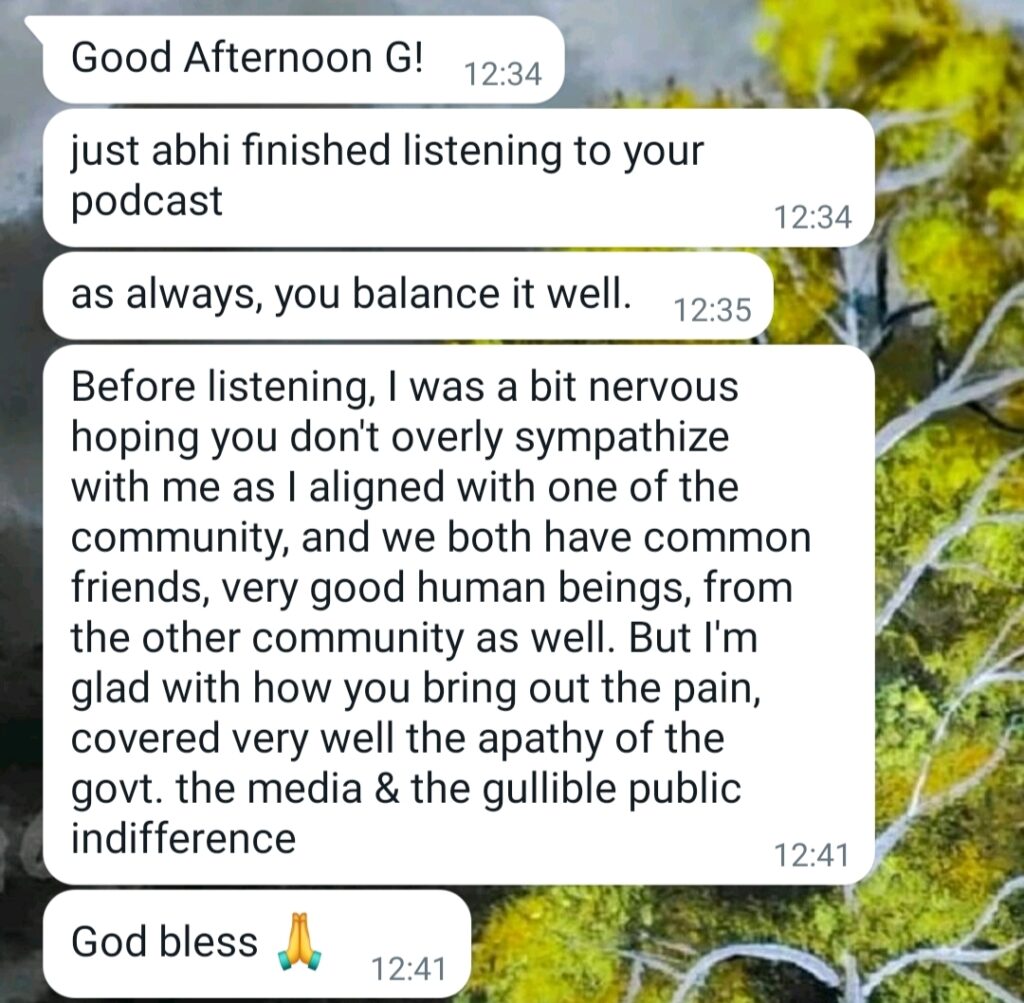{ This is a transcript of the Ep 11 of The Creative Zindagi Podcast, see details at the end of article }

परिचय/भूमिका
करीब एक महीने या उससे कुछ अधिक पहले, अपने एक पुराने दोस्त से बात हुई, बात तो कम ही करते हैं हम सब आजकल, पर व्हाट्सप्प पर लंबी चैटिंग को भी अगर उसी कैटेगरी में रख सकें तो समझो बात ही हुई थी। दिल्ली में ऑफिस के दिनों में दोस्ती हुई, और मैं उसके स्वभाव को देखकर सोचा करता था कि कोई इतना सीधा सरल और साफ दिल कैसे हो सकता है। उसकी हिन्दी टूटी फूटी थी, पर जो भी शब्द वो मेहनत से इस्तेमाल करता था वो ऐसे होते जिनहे सुनकर हिन्दी हमारी मुह से निकलने वाली मिक्स्ड वेजीटेबल सब्जी जैसी भाषा से बेहतर सुनाई देती थी। वो ऐसा इंसान है जो बहुत कम ही हमारे साथ किसी आउटिंग या ट्रिप पर जाता था, अक्सर हम उसका मज़ाक उड़ाते कि सनडे है तो इसको तो चर्च में जाना होगा, जैसे चर्च इसके बिना बंद हो जाएगा वागेरह वागेरह। पर मज़ाक ऊपरी था। हर कोई उसकी रेस्पेक्ट करता था। वो कभी किसी बहस में नहीं पड़ा। कितनी भी दिक्कत हो उसके चेहरे पे मुस्कान ही नज़र आती थी। इस दोस्त को दोस्त ही कहूँगा इस एपिसोड में, क्यूंकी उसकी पर्मिशन के बिना ही उसके बारे में कहा जा रहा है, जो मुझे जानने वाले हैं समझ जाएंगे और वो भी समझ ही जाएगा। और हाँ, मुझे पता है पर्मिशन वाली इस बात का वो बुरा भी नहीं मानेगा।
मुद्दे की बात
ये सब में क्यूँ बता रहा हूँ। वो इसलिए की उस व्हाट्सप्प चैट की शुरुवात उसके स्टेटस में लगे एक गुस्से से भरे पर मर्यादित शब्दों को पढ़कर हुई। अचानक मुझे याद आया की ये दोस्त मणिपुर से है, अक्सर हम नॉर्थ ईस्ट को लेकर इतने लापरवाह रहते हैं की मणिपुर, नागालैंड, असम और अरुणाचल सब एक समझते हैं जैसे की हमारे लिए बंगाल के आगे जो भी है, वो नोर्थे ईस्ट है, सब एक बराबर। हाँ बचपन में मार्क्स लाने के लिए स्टेट्स और कैपिटल याद करते थे।

खैर किस्से की तरह आगे बढ़ते हैं । फिर याद आया की जिस जगह जातीय हिंसा भड़की है उस जगह का नाम पहले भी सुना है। इसी दोस्त से , क्यूंकी इसका गाँव वहीं है। मेंने उसका स्टेटस देखकर बात की और हाल चाल पूछा, तो उसने बताया की सब ठीक है। पर धीरे धीरे बात आगे बढ़ी तो मुझे पता चला की कितनी मुश्किलों से उसने अपने परिवार की महिलाओं और बच्चों को दिल्ली बुलवाया था एक दिन पहले, बच्चों से मेरा मतलब एक 6 7 महीने का बच्चा। परिवार के आदमी अभी भी वही हैं क्यूंकी घर देखना है, और वहाँ का हाल बहुत बुरा है। (ये लिखे जाने और पॉडकास्ट एपिसोड के पब्लिश होने के बाद पता चला की उसके रिश्तेदार अब लौट चुके हैं, पर हालात अभी भी बहुत खराब हैं)
न्यूज़ या फेक न्यूज़ ?

क्यूंकी में टीवी न्यूज़ से दूर रखता हूँ खुद को तो मुझे मणिपुर की खबर थी। ये व्यंग्य या स्टायर नहीं है सच है बिलकुल, अगर आप देखें तो जो लोग न्यूज़ को मन लगाकर देखते हैं वो अक्सर सच से दूर होते जा रहे हैं। क्यूंकी न्यूज़ और फ़ेक न्यूज़ में ज़्यादा फरक नहीं रह गया, मुझे इतना तो पता था की वहाँ के मैदानी इलाके के लोग और जंगलो से आने वाले ट्राइ बल लोग आपस में उलझ पड़े हैं और इस कदर जैसा हमने पहले कश्मीर में देखा सुना है। या और भी कई जगह और हम सब जानते हैं की ऐसा कुछ होने के बाद सालों साल लग जाते हैं सब कुछ सामान्य जैसा होने में। सामान्य होता तो कभी है ही नहीं। उससे थोड़ी और बात की और उस दिन के बाद भी जो कुछ न्यूज़ जो में पढ़ रहा था या यूट्यूब से जानकारी मिल रही थी उसको भेज कर चेक किया की क्या सही है की नहीं। और वो लगभग सहमत था। उसने बताया की किस तरह जो लोग दंगे कर रहे हैं वही फाके न्यूज़ भी फैला रहे हैं , जिससे बात सुधारने की बजाए बिगड़ती ही जा रही है।
बेखबर समाज!
हैरानी की बात मुझे यही लगती रही की जिस देश में इतना कुछ हो रहा है वहाँ के बाकी प्रदेशों के लोगो को इस बारे में कुछ अंदाज़ा ही नहीं , और जो है वो भी उतना ही जितना न्यूज़ चैनल द्वारा थोड़ा बहुत ऊपरी तौर पर बताया गया है बस वही। ये सब क्यूँ हो रहा है, कौन करवा रहा है, इस बारे में यहाँ बात करने का कोई फायदा नहीं, समय आने पर हमें समझ आएगा या शायद न भी आए।

बात इस बारे में है की क्यूँ हम ऐसे मुद्दों पर बात करने से भी घबराते हैं। एक नागरिक, एक इंसान के तौर पर कम से कम इतना तो किया ही जा सकता है। ये बात समझ आती है की आम आदमी अपनी रोज़ी रोटी जुटाने में इतना व्यस्त है कि उसे फुर्सत कहाँ । पर अगर हम जर्नलिस्ट या कला क्षेत्र में जुड़े लोगो की बात करें तो वो भी मुंह बंद किए रहते हैं। ये कैसा समाज है जिसे इस बात से तो फरक पड़ता है की पड़ोस के देश में टमाटर कितने रुपए किलो है, बिग बॉस में किसने क्या किया, क्या कहा ,पर इस बात से नहीं की उसके अपने देश में सेंकड़ों लोग मर रहे हैं, और हजारो बेघर हो रहे हैं।

हम बड़ी बड़ी बात करते हैं, क्रिटिकल थिंकिंग, एडुकेशन, हम चाँद पर भी जा रहे हैं, वो भी उतने पैसों में जीतने में एक बड़ी बजट की मूवी बनती है, हर हफ़्ते एक नई ट्रेन चल रही है, और भी न जाने क्या क्या हो रहा है। बहुत बुरा और बहुत अच्छा भी। पर अगर आपके घर में ऐसा कुछ हो रहा हो तो आप आँख मुंह बंद करके कैसे रह सकते हैं। और ये कहना की हमारे एक के कहने से क्या होगा, गलत है, समाज हमसे अलग नहीं है, और अच्छा बुरा जैसा भी है हम से ही है। तो एक के कहने से शायद दूसरे को समझ आए जो समझ नहीं पा रहा। समझ न भी आए कम से कम सोचेगा तो सही।
सोचिए !
अब सोचिए अगर आपके शहर में ऐसा कुछ हो, और दो महीने तक न इंटरनेट हो न उस बारे में कहीं मीडिया में खबर आए। और आप अगर प्रोटेस्ट करें दिल्ली जाकर तो वो भी न कवर किया जाए । अगर आप अपने शहर से बाहर हैं और आपके परिवार वाले वहाँ फंसे हों , और आपके दोस्त या पड़ोसी इन बातों से पूरी तरह अंजान, आपको कैसा लगेगा?
अभी पिछले साल कश्मीर पर फिल्म बनी, बहुत पैसे कमाए, बहुत से लोगों ने देखी और देखकर अपना खून खौलाया, क्या हासिल हुआ? धर्म के नाम पे नफरत। लोगो का कहना था हमें जानना चाहिए। बात ठीक है जानिए। पर जो अभी हो रहा है, उसे जान बूझकर कैसे अनदेखा कर सकते हैं। आज जो कुछ भी हो रहा है मणिपुर में, उस पर भी आने वाले समय में फिल्में बनेंगी और खूब करोड़ों रुपए कमाएँगी। और हम जाकर देखेंगे भी और कहेंगे की बहुत बुरा हुआ था। वागेरह वागेरह पर हम ये भूल जाएंगे की जो हो रहा है हम सब उसका हिस्सा हैं। क्यूंकी हम उसी समय में, उसी देश में जी रहे हैं।
द आर्ट ऑफ व्हाटबाउटरी !
एक और बात जिसकी आदत हो गई है हम सबको या यूं कहें, फ़ेक न्यूज़ की तरह एक और बीमारी है,उसका नाम है whataboutery, सोर्री, ये बीमारी नहीं आर्ट है। इस पॉडकास्ट में हम आर्ट और क्रीएटिविटि से जुड़ी और ऐसी चीजों की बात करते हैं जो हमारी ज़िंदगी पर असर डालती हैं और जरूरी हैं। तो फ़ेक न्यूज़, और व्हाटबाउटरी जैसे आर्ट के बारे में भी बात करते रहना चाहिए। फ़ेक न्यूज़ पर कोविड के टाइम पर एक आर्टिक्ल लिखा था , पढ़िएगा, ये समझ आएगा की हमने कितनी तरक्की की है इस आर्ट फॉर्म में। और रही दूसरे आर्ट की बात वॉट अबाउटरी ये बहुत ज़हीन किस्म का आर्ट है, इसमें हर कोई टैलेंटेड नहीं। एक्जाम्पल के तौर पे, अगर कोई पिता अपने बेटे से पूछे की कितने मार्क्स आए इस बार, तो बेटा उल्टा पिता से पूछे, पापा आपके कितने नंबर आए थे 12थ में , और अगर पिता के कम मार्क्स आयें हो तो वो कुछ टाइम के लिए तो उलझन में पड़ जाएगा। कि अब इससे कैसे सवाल करूँ।
तो बात साफ थी बेटे को अपने मार्क्स बताने नहीं थे, क्यूंकी वो फ़ेल हो गया था। पर उसके अंदर व्हाटबाउटरी का टैलंट इतना था की उसने अपने पिता को भी भटका दिया। यही टैलंट आप अपने आस पास पाएंगे। जब आप किसी भी संवेन्दंशील मुद्दे पर लिखेंगे या बात करेंगे। जरूरी नहीं ये सोश्ल मेडिया पर हो। आपके अपने परिवार, या दोस्त भी ऐसे होंगे जो जाने अनजाने में व्हाटबाउटरी पर उतार आएंगे और सोचेंगे की वो जीत गए। पर असल में हम सब हार जाते हैं ऐसा करके। जो बात हो उसी पर बात हो, तो उसका कोई फायदा है।

व्हाटअबाउटिज़्म: सामाजिक चर्चाओं में इसे कैसे पहचाना जाए और इससे कैसे बचा जाए?
अगर मणिपुर या किसी भी और मुद्दे पर, चाहे वो पर्सनल हो या सामाजिक कोई आकर आपको अपने व्हाटबाउटरी टैलंट दिखाये तो आप भटकने की बजाए, बस शांति से अपनी बात पर अडिग रहें। सवाल कीजिये , सवाल करना जरूरी है, अगर सरकार या किसी और से नहीं भी कर सकते तो खुद से कीजिये, की ये जो आप हर बात को घुमाकर खुद को ही बहला रहे हैं उससे क्या हासिल होगा? फ़ेक न्यूज़ वाले टैलंट में हम बस इतना कर सकते हैं की कुछ भी शेयर करने से पहले चेक कर लें वो सही है या नहीं। वो बात अलग है की अगर आप ऐसी वेब साइट और न्यूज़ चैनल पर भरोसा किए हैं जो धड़ल्ले से फ़ेक न्यूज़ या अधपकी न्यूज़ परोस रही हैं, तो फ़ेक न्यूज़ के जाल से बचना थोड़ा मुश्किल हो सकता है। पर कोशिश करते रहिए।
आखिर में !
अंत में मणिपुर के उस दोस्त से माफी, की उसकी बातें यहाँ कही। पर हाँ किसी दिन हो पाया तो उसको बुलाकर सीधा बात करेंगे। वो बहुत अच्छा इंसान है और इतना कुछ होने पर भी उसमें उम्मीद है, ऊपर वाले पर भरोसा है, उसका एक्जाम्पल लेकर में अक्सर कहता रहता हूँ की गॉड फियरइंग नहीं गॉड लविंग होना चाहिए हमें। एक दूसरे से सीखते रहिए, और कोई भी आर्ट फॉर्म सीखें पर फ़ेक न्यूज़ और व्हाटबाउटरी न सीखें।
जल्दी मिलते हैं एक नए एपिसोड में,सुनने के लिए बहुत शुक्रिया ! ( यहाँ पढ़ने के लिए शुक्रिया )

Follow & Share – The Creative Zindagi Podcast
You can also connect and share your views on below social handles.
The Creative Zindagi Podcast episodes are also available on all leading audio platforms
- Hubhopper – https://bit.ly/TCZPHubHopper
- Spotify – https://spoti.fi/3PKEgIP
- Amazon Music – https://amzn.to/3XCvBKH
- Google Podcasts – https://bit.ly/TCZPGoogle

Feedbacks – Reader’s POV